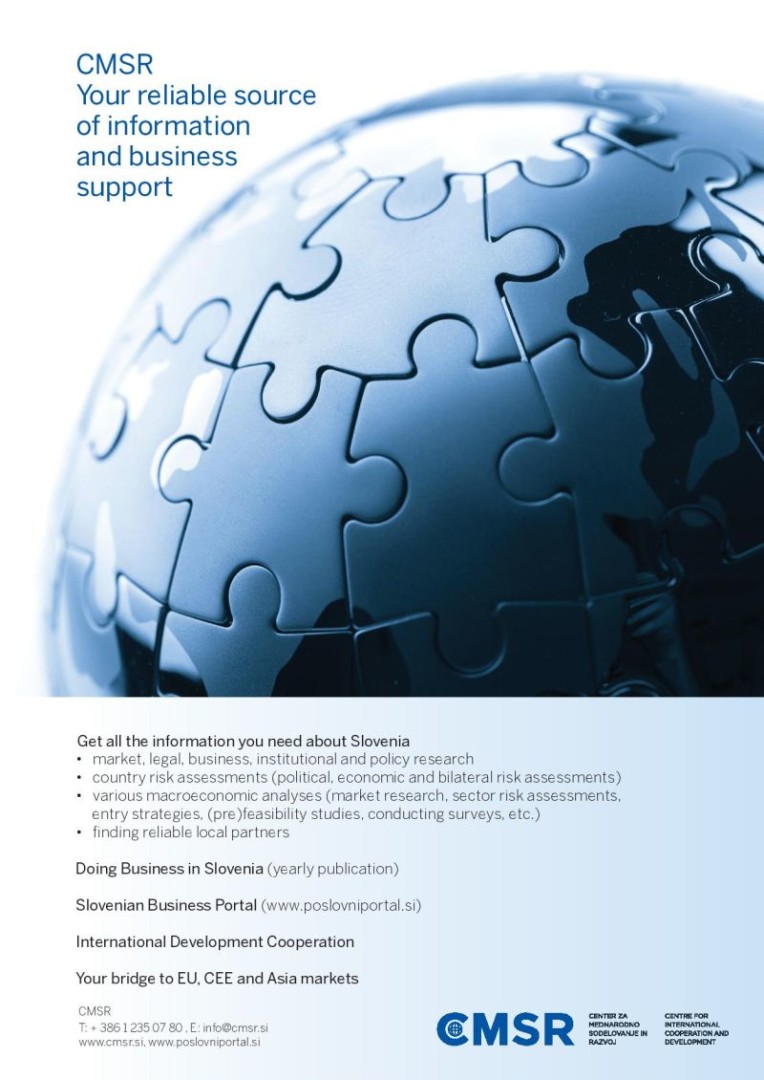Accounting and auditing are regulated by the Companies Act, Accounting Act, Auditing Act, and the Slovenian Accounting Standards (or the IFRS as adopted in the EU), in accordance with EC Directives 2013/34/EU, 2006/43/ES, and Regulation 537/2014 and the International Financial Reporting Standards as determined by Regulation 1606/2002/EC and Regulation 1126/2008/EC.
The size of companies relevant for accounting, auditing and disclosure purposes is defined as follows: Micro company (two of the following conditions must be fulfilled):
- less than 10 employees;
- annual income less than EUR 700,000; and
- asset value less than EUR 350,000.
Small company (two of the following conditions must be fulfilled):
- less than 50 employees;
- annual income less than EUR 8,000,000; and
- asset value less than EUR 4,000,000.
Medium-sized company (two of the following conditions must be fulfilled):
- less than 250 employees;
- annual income less than EUR 40,000,000; and
- asset value less than EUR 20,000,000.
Large company (two of the following conditions must be fulfilled):
- more than 250 employees;
- annual income more than EUR 40,000,000; and
- asset value more than EUR 20,000,000.
Company is in any case considered as large company, if it is:
- public interest entity which securities are traded on a regulated securities market, a credit institution as defined by the law governing banking and an insurance and pension company as defined by the law governing insurance;
- a public interest entity in the case of a company subject to statutory audit and in which the state or municipalities or independently, directly or indirectly, have a majority shareholding,
- stock exchange,
- a company which must prepare a consolidated annual report.
Public interest entity (as defined in Auditing Act) is a company which securities are traded on a regulated securities market, a credit institution as defined by the law governing banking, an insurance company as defined by the law governing insurance and a pension company as defined by the law governing pension companies. Public interest entity is also a company subject to statutory audits according to the criteria of the law governing companies in which states or municipalities, jointly or independently, directly or indirectly, have a majority ownership share. Public interest entity may also be another legal entity related to statutory audits, if so provided by another law.
Bookkeeping
Companies and entrepreneurs must keep business books and must close them annually. Business books are kept on a double-entry bookkeeping basis (small entrepreneurs can use single-entry bookkeeping).
The following annual accounting reports should be produced on the basis of closed business books for each business year (which may differ from the calendar year):
- balance sheet; and
- income statement.
The two reports jointly and as a whole present the assets and liabilities of companies or entrepreneurs, their financial positions and business results.
Companies and entrepreneurs, save for entrepreneurs subject to flat-rate taxation, must within 3 months of the calendar year ending submit to the AJPES annual-report data on their property and financial operations, along with their profit/loss account for national statistics and other purposes of recording, analyses, information, research and tax.
A check should be performed at least once a year to compare certain items of assets and liabilities in the business books against the actual situation.
Business books, balance sheets, income statements as well as annual and business reports must be kept permanently, whereas bookkeeping records need to be retained only for a certain period of time.
Annual reports
The annual reports produced by large and medium-sized capital companies and dual companies must contain the following:
- a balance sheet (the position of assets and liabilities in relation to the source of assets at the end of the business year);
- an income statement (revenues, expenditures and business results for the business year);
- a statement of comprehensive income;
- a cash flow statement (flow of revenues/expenditures or inflows/outflows in the business year, including an explanation of any changes in the position of cash and cash equivalents);
- a statement on changes in equity (changes in certain equity items in the business year, including the net profit and loss coverage);
- disclosures with an explanation of the reports and supplementary reports as stipulated by law (the methods used, together with data on dependent companies, the share in equity, individual share categories, average number of employees etc.); and
- a business report (presentation of development of the business and the company’s position, along with changes in business events following the end of the business year, presentation of the company’s anticipated development, the company’s research and development activities, a report on subsidiaries, the activities of subsidiaries abroad).
The annual reports of ‘small cap’ companies whose shares are not listed on the stock exchange must contain at a minimum:
- a balance sheet (the position of assets and liabilities in relation to the source of assets at the end of the business year);
- an income statement (revenues, expenditures and business results for the business year); and
- disclosures with an explanation of the reports and supplementary reports as stipulated by law (the methods used, together with data on dependent companies, the share in equity, individual share categories, average number of employees etc.).
The annual reports of entrepreneurs and personal companies must comprise at least the balance sheet and income statement. They must be clear and transparent and include a genuine and honest presentation of the company’s assets and liabilities, its financial position and business results.
Consolidated annual report
Slovenia-based companies with one or more subsidiaries (in Slovenia or abroad) must produce consolidated annual reports. The Companies Act specifies the criteria for establishing a parent–subsidiary relationship between companies. A subsidiary company need not be included in the consolidation if that is not necessary to ensure a true and fair presentation. A consolidated annual report presents the financial position and business results of all the companies that are included.
A parent company that together with its subsidiaries does not meet the conditions to be classified as a large company (the criteria of net sales income and the value of assets being increased by 20%) need not produce a consolidated annual report. This does not apply if securities of the parent company or any of its subsidiaries are traded on the regulated market.
The consolidated annual reports of quoted companies must be prepared in line with the IFRS as adopted in the EU.
Audit
Auditing must take place pursuant to the Auditing Act, the principal accounting policies, other auditing rules adopted by the Agency for Public Oversight of Auditing, and by the International Standards on Auditing and International Auditing Practice Statements adopted by the International Auditing Practices Committee of the International Federation of Accountants and to other laws governing the auditing of individual legal persons and other auditing forms and by the rules adopted on the basis thereof.
An audit is compulsory for:
- large and medium-sized companies; and
- dual companies.
Audits must be carried out within 8 months of the end of the business year. Audit companies and audited companies enter into a special agreement which sets out the rights and duties of both parties, as well as the price of the auditing services, and shall be established for at least three years.
The management of an audited company must submit all necessary documents to the audit company, enable it to review its business books, documents and computer files in regular business hours, and access its business premises. Adequate premises and support must be made available to the auditor. If the review and assessment of any item in the accounting reports require specialised expert knowledge, the company shall obtain the opinion of an expert from the relevant area at the request of the audit company.
Audit companies shall conduct audits in a responsible and impartial manner, observing the principle of confidentiality. An audit company is liable (up to EUR 150,000 for small companies, EUR 500,000 for medium companies and EUR 1,000,000 for large companies) for any loss incurred due to a violation of the audit rules. This limitation does not apply to intentional damage or any loss arising from serious negligence.
Following completion of an audit, the certified auditor shall produce an audit report containing their professional opinion and details of the reviewed accounting reports and audit standards used, including the auditor’s opinion on whether the accounting report represent true and fair view of company's financial situation.
All audit reports (including reports on the auditing of foreign companies) must be prepared in the Slovenian language.
Additional rules apply to the auditing of banks, insurance companies, brokerage companies, trusts and other financial organisations.
If a small capital company measures property, plant and equipment at a revalued amount or measures financial instruments which are not traded on an organised market at fair value, its annual report must be reviewed by an audit company.
Publication
For publication purposes, the annual reports along with the auditor’s report must be submitted to the Agency of the Republic of Slovenia for Public Legal Records and Related Services (AJPES) within 8 months of the end of the business year, whereas the annual reports of entrepreneurs (apart from those taxed on a flat-rate basis) and small companies whose securities are not traded on an organised market must be submitted within 3 months of the end of the business year.
AJPES publishes annual and auditor reports on its webpage dedicated to publishing such reports. To appear on this webpage, companies or entrepreneurs pay a fee according to a tariff. One can access the annual reports and auditor’s reports published online for free, whereas a fee is required for any copies of these files (in paper or electronic form).
Publication relating to branches of third-country companies
The law distinguishes branches of EU companies and those of third-country companies. The branch of an EU company can submit its parent company’s annual report provided it was prepared in line with the legislation of an EU country.
The branch of a third-country company can only submit the annual report of its parent company if that report was prepared pursuant to EU Directive 2013/34/EU. Otherwise, the branch must produce and disclose its own annual report prepared according to those requirements.







